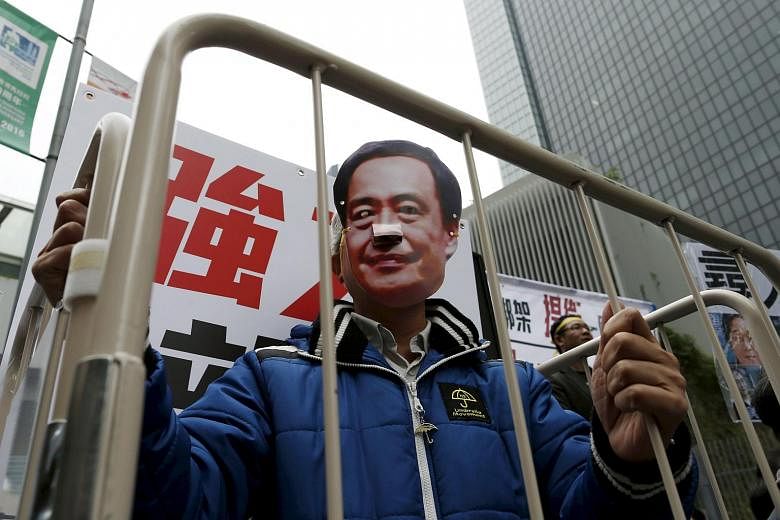Hong Kong bookseller Lee Bo finally returned home from mainland China last Thursday afternoon.
He met the police to cancel the missing persons report his wife Sophie Choi had filed after he went missing last December, spoke to Beijing-friendly media in an apparently pre-arranged interview and lavished effusive praise on China, including its justice system.
Far more quietly, Ms Choi made a reverse journey. At around 8am the same morning, she left Hong Kong for mainland China.
Less than 24 hours after entering Hong Kong, Mr Lee departed as well, re-crossing Shenzhen River into Guangdong. He was escorted in a car with a cross-border licence plate.
The movements are hardly sheer coincidence, said analyst Willy Lam. "It is reasonable to speculate that Lee Bo's wife was being held hostage and that Beijing was intimidating him. He was under heavy pressure not to say anything that would embarrass them."
If true, the actions by the Chinese authorities fit in with an emerging broader pattern of using loved ones as leverage against detractors, as Beijing hunts for the authors of an anonymous online letter calling on Chinese President Xi Jinping to resign.
In recent days, critics of the Chinese Communist Party (CCP) said their family members have been seized. Germany-based commentator Chang Ping, who has written about the letter but said he did not pen it, said his two younger brothers and a younger sister were "abducted by the Chinese police" on Sunday during a trip home to Sichuan to celebrate their father's birthday.
"I've learnt that the police asked my family to contact me and demand that I immediately cease to publish any articles that criticise the CCP... or the government would find ways to charge my family members," he wrote on a US-based site.
Another known critic of the CCP government, New York-based blogger Wen Yunchao, said last Friday that his parents and brother were taken away in Guangdong, after he tweeted a link to the letter.
In Mr Lee's case, his 20-year-old autistic son appears to have been drawn into the episode as well.
Mr Lee told reporters in Hong Kong that he was preparing to take his son to the mainland for treatment because of the "advanced medical resources" there.
Dr Lam surmised: "So long as his son is in China, the authorities will be assured that Lee Bo will not spill the beans on who abducted him and what transpired during the three months he was there."
Mr Lee, 65, had vanished on Dec 30 last year, triggering talk that he was taken away by Chinese agents, in a breach of the "one country, two systems" policy. His four colleagues at a publishing firm and bookshop that sold salacious political material about CCP leaders also disappeared.
Mr Lee denied that he had been abducted and said that he wants to leave the book business to start "another page in my life".
Observers said his brief sojourn in Hong Kong was part of what appears to be a highly orchestrated performance - one that raises more questions than it answers.
Bar Association president Winnie Tam told local media that it was the most serious incident in Hong Kong since the 1997 handover. "The answer we are being asked to accept, we don't know where any of it came from. Even people with common intelligence will think there are more questions than answers."
Still, Mr Lee's release does serve a purpose: However "fake", it got the Hong Kong government off the hook as it would no longer have to pursue the matter, said Dr Lam.
But the damage to the "one country, two systems" policy is done, and a suitably chilling effect has been cast. "Critics... will now worry not just about being abducted but also about having their spouses and children held hostage."


